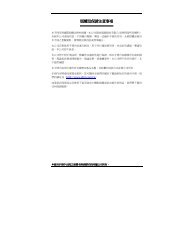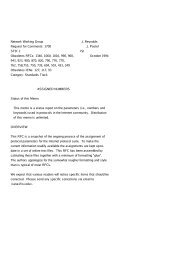Network Working Group R. Fielding Request for Comments: 2616 ...
Network Working Group R. Fielding Request for Comments: 2616 ...
Network Working Group R. Fielding Request for Comments: 2616 ...
Create successful ePaper yourself
Turn your PDF publications into a flip-book with our unique Google optimized e-Paper software.
strongly correlated to the membership of a particular ethnic group.User agents which offer the option to configure the contents of anAccept-Language header to be sent in every request are stronglyencouraged to let the configuration process include a message whichmakes the user aware of the loss of privacy involved.An approach that limits the loss of privacy would be <strong>for</strong> a user agentto omit the sending of Accept-Language headers by default, and to askthe user whether or not to start sending Accept-Language headers to aserver if it detects, by looking <strong>for</strong> any Vary response-header fieldsgenerated by the server, that such sending could improve the qualityof service.Elaborate user-customized accept header fields sent in every request,in particular if these include quality values, can be used by serversas relatively reliable and long-lived user identifiers. Such useridentifiers would allow content providers to do click-trail tracking,and would allow collaborating content providers to match cross-serverclick-trails or <strong>for</strong>m submissions of individual users. Note that <strong>for</strong>many users not behind a proxy, the network address of the hostrunning the user agent will also serve as a long-lived useridentifier. In environments where proxies are used to enhanceprivacy, user agents ought to be conservative in offering acceptheader configuration options to end users. As an extreme privacymeasure, proxies could filter the accept headers in relayed requests.General purpose user agents which provide a high degree of headerconfigurability SHOULD warn users about the loss of privacy which canbe involved.15.2 Attacks Based On File and Path NamesImplementations of HTTP origin servers SHOULD be careful to restrictthe documents returned by HTTP requests to be only those that wereintended by the server administrators. If an HTTP server translatesHTTP URIs directly into file system calls, the server MUST takespecial care not to serve files that were not intended to bedelivered to HTTP clients. For example, UNIX, Microsoft Windows, andother operating systems use ".." as a path component to indicate adirectory level above the current one. On such a system, an HTTPserver MUST disallow any such construct in the <strong>Request</strong>-URI if itwould otherwise allow access to a resource outside those intended tobe accessible via the HTTP server. Similarly, files intended <strong>for</strong>reference only internally to the server (such as access controlfiles, configuration files, and script code) MUST be protected frominappropriate retrieval, since they might contain sensitivein<strong>for</strong>mation. Experience has shown that minor bugs in such HTTP serverimplementations have turned into security risks.













